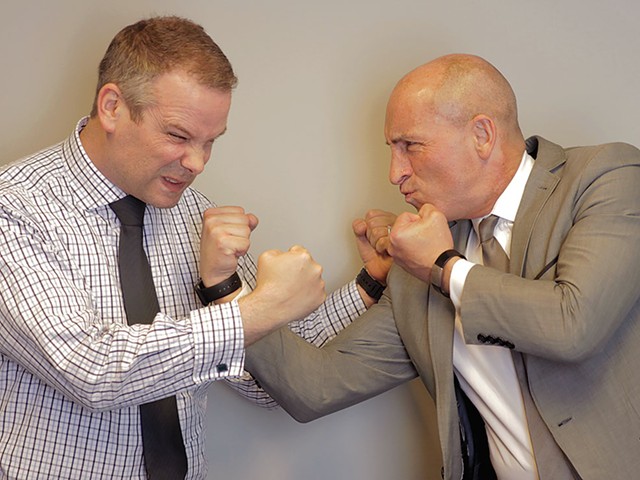When I read Margaret Atwood’s explanation of what prompted her to write “The Handmaid’s Tale,” I began to wonder how quickly a country or a place or a life could be altered in a political or religious coup. That kind of overnight change hasn’t happened to white Americans in my lifetime. Or has it?
Is Atwood a soothsayer?
Are we foolish, or simply arrogant, when we read about the disemboweling of Syria and the ever-widening fist of power by Recep Tayyip Erdogan in Turkey and conclude “It can never happen here?”
The GOP’s desire to control women’s reproductive choices may very well signal the end of access to abortion as my generation and those after me know it. Vice President Pence would ban abortion outright if he had his way and is outspoken about his position.
Similarly, Gov. Matt Bevin is clear in his stance on abortion: None.
His administration is trying to close EMW, the last clinic wherein a woman can obtain an abortion in the state. EMW filed for an injunction to keep the clinic open. The ACLU of Kentucky joined the suit. On Friday, a federal judge temporarily blocked Bevin’s effort.
But he isn’t alone. The Right to Life here and nationally is inarguably a well-oiled machine.
Why does it matter? The United Nations and the World Health Organization cite a woman’s ability to determine whether and when she will bear children as a fundamental determinant to her quality of life worldwide. When a woman can delay having children, she can obtain an education and lift herself and her family — should she choose one — out of poverty.
Education, for girls, is the key to a kingdom.
Take the Revolution in Iran in 1979 when Ayatollah Khomeini deposed Mohammad Reza Shah. Tehran was a bastion of women’s rights prior to Khomeini’s reign. Women could vote, they wore what they chose, they were covered by the Family Rights Act that allowed them to divorce and even collect support from men.
And one day in 1979, it all changed.
Many Americans saw the Iranian Revolution as a religious shift that stripped women of almost all autonomy, but actually it was a cultural shift not based in the Quran, said Haleh Karimi, a 28-year Louisville resident and currently the executive director of Interfaith Paths to Peace. Karimi, who came from Tehran at 13 to live with her aunt in St. Louis, said the Revolution changed her life without warning.
“The year before the Revolution happened, I had no idea it would come,” Karimi said. “Then [pre-Revolution] there were mixed schools and no forced Islamic traditional practices on women. Tehran was known as ‘Paris of the Middle East.’” Karimi said Tehran’s education system was phenomenal — women enjoyed nearly equal rights to men in work and leisure and were required to be in the military.
When the Revolution came, she said, “women were a big part of it, thinking we will have progress for the better. Then, our rights started to be stripped and women began to revolt.” Protests were met with guns and bats, Karimi said and “No more protests.”
When I asked how Khomeini’s regime was able to stifle and subjugate Iranian women accustomed to centuries of freedom, Karimi said: “Fear and intimidation.”
Atwood wrote in the opening paragraphs of her “Handmaids Rising” piece in the New York Times Book Review about the speed at which worlds as we know them can turn upside down: “Having been born in 1939 and come to consciousness during World War II, I knew that established orders could vanish overnight. Change could also be as fast as lightning. ‘It can’t happen here’ could not be depended on: Anything could happen anywhere, given the circumstances.”
As Karimi reflected on the change the Revolution brought to womens’ lives so quickly in Iran, she said: “Little by little everything will be taken from you if you do nothing.”
Karimi, for her part, regularly speaks about Islamaphobia in an effort to breed tolerance and unify our community.
Meanwhile, my tolerance for rights violations is at an all-time low. In the words of the inimitable Dr. Angela Davis, “I am no longer accepting the things I cannot change. I am changing the things I cannot accept.”
What about you?






